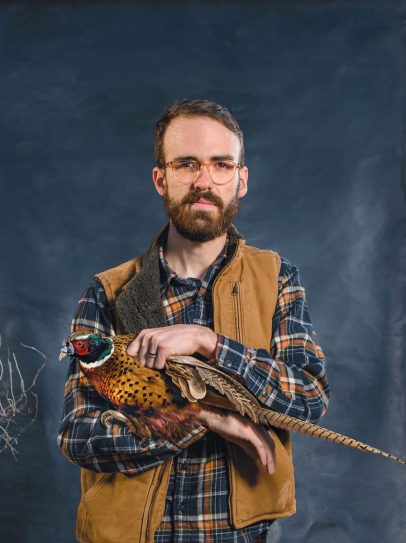Colin Stringer
“Thoughtful.”
That is the one word which encompasses Colin Stringer’s entire approach to working in a kitchen. From the sourcing of ingredients, to the preparation and presentation of his dishes, all the way to the ambient details of service, being thoughtful and intentional drives the way he works.
The concepts Colin is known for locally have been defined by this philosophy of mindfulness. The defunct supper club, Nani, was a bright star in the Oklahoma City food scene. Operating out of a house near the Plaza district, it was reservation-only, and somewhat on the hush-hush. Word of mouth was massive, and dinners would often be booked up weeks in advance. Lucky diners were treated to ten or more courses that were a mish-mash of wild edibles, molecular gastronomy, and traditional Japanese cooking. It was short-lived, mostly due to a vicious struggle with a baffled health department who had no way of regulating this mode of underground eatery. Anyone lucky enough to have sat at their communal table will never forget the experience.
His current project, Nonesuch, is a natural progression from Nani. It is a series of weekly pop-ups that serve multiple courses of gorgeous and creative food.
“The constraints we’re working in for Nonesuch are even stricter than Nani. [At Nani], we focused on local cuisine, but we also served mackerel. At Nonesuch, we’re trying to hone it in even further: if it’s produce, if it’s protein, if it’s dairy, it’s from Oklahoma, period, or we’re not serving it,” Colin explains. “The only ingredients that we use that aren’t from Oklahoma are some vinegars, maybe some spices—that’s it.”
This obsession with local is rare, but essential to their end goal.
“We want it to taste Oklahoman.”
Such a heavy reliance on Oklahoman ingredients creates a lot of extra legwork for their crew. Colin has learned that for unique food, you can’t rely on the Ben E. Keith truck dropping everything off. There are some things you have to go out and look for. Learning to forage was a skill he clued into early on.
“I used to hunt morel mushrooms here and there, but that was the extent of my foraging. I was an Eagle Scout, and we used to memorize tree leaves. I remember being able to identify a few wild plants. When we started doing Nani full-time, we made it a priority to do it as much as we could.”
There’s a major advantage that comes with sourcing your own ingredients. “The thought I have behind it is that utilizing these wild plants gives us a pantry that other people don’t really have access to. It makes our food more interesting, more connected to our time and place.”
Not all of Colin’s experience comes from local forests and kitchens. He has spent a good chunk of time traveling and staging in other restaurants. He advises this experience for any person looking to become a better cook. “The best way to get into cooking is to work under a chef that you think has created really excellent food and is passionate, and do whatever that person says.”
Last year, he spent two months at Blanca, a Michelin-starred restaurant in Bushwick, Brooklyn. Operating from an open kitchen behind a 12-seat counter, Blanca serves a multi-course tasting menu with inventive dishes. “I’ve never seen a kitchen that runs like Blanca,” Colin explains. “There’s 3 to 4 cooks that work there, and it’s the most professional, consistent, flawless food I’ve ever seen. The hardest place I’ve ever worked, for sure. It’s a very military-feeling kind of place. You get berated a lot. That is a way to create perfect food, but it isn’t the only way. They do 25 courses in a 3 hour dinner, and it’s flawless.”
In addition to Blanca, Colin also staged at Next in Chicago. Next is the second restaurant from Grant Achatz, the chef from legendary molecular gastronomy trailblazer Alinea. The exciting and innovative idea behind it is that the entire concept changes every three months. Not only does the menu completely flip, but even the interior décor is altered so it looks like a truly different restaurant. In contrast to the small, intimate room of Blanca, Next does 135 covers on a busy night. Colin describes working there as “running with your head cut off from 9 am to midnight, every day.”
Bringing back those experiences has helped him refine not only his cooking, but his vision for the way to run his own restaurant. Colin realizes there is a limited, if growing, segment of Oklahoma City who are willing to spend nearly $100 for a meal where the menu is a surprise. “We’re asking a lot of the guest. Our dinners are a lot more money than most dinners, and I get that. My worry is that guests don’t see the back end of it, and how much it can take to do a dinner like that. Or that we’re big-headed and think the dinner should cost that much. In fine-dining, it’s sometimes hard for guests to see how much work goes into it.”
He emphasizes the uniqueness of the experience while downplaying the novelty of being part of the current hyperlocal movement. “Of course we forage, of course we source locally, of course we do all these things because that’s what responsible chefs do in 2016. I want to focus on the experience, I want people to see the food, taste the food.”
Part of that experience is knowledge of what you’re consuming. The realization of eating an all-local meal puts your surroundings into focus. It opens your eyes to a myriad of edible things all around, even in your own backyard, and it helps you see your environment as that much more precious.
Colin tells a story about the epiphany of eating wild fruit: “There’s this part of a trail where we forage (I won’t say where it is because I don’t want you stealing my persimmons). Every fall, persimmon trees are along this trail, and I’ll take this branch and shake it, and the ripe ones fall right off. They’re soft, they’re gooey, and you can just pick them off the forest floor and sit there eating them. That’s my favorite thing to do. There are few eating experiences like that which are still so pure. They’re only like that for about two weeks a year, but that’s the beauty of foraging—the timeliness of it. That’s all you have. The fleetingness of the food really excites me. We spend weeks preparing some of these courses, and then it’s gone in a bite. You start over the next day. It reincorporates life and death. That’s what I feel in cooking, the reality of this earth we live on.”




